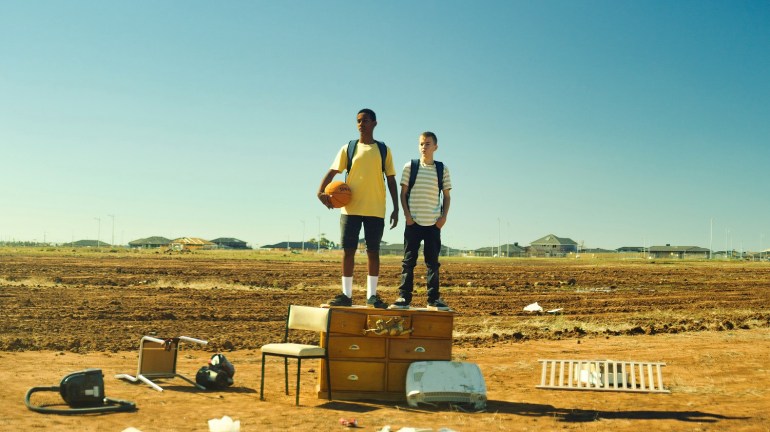John Sheedy’s Tarneit has beaten a field of 35 global shorts to become the fourth Australian winner of the annual Iris Prize.
Part of the Cardiff-based Iris Prize LGBTQ+ Film Festival, the Michael Bishop Foundation-sponsored award is the largest of its kind, with £30,000 on offer to the winner.
Tarneit tells the story of Tyrone (Calvin Black) and Clinton (Antanhe Zewdu), two Deaf teenagers who, despite their shared sense of neglect, also share a bond and a dream of one day escaping the violence that swirls around them.
The film, which also stars Nicci Wilks and Nicholas Coghlan, was shot during COVID-19 lockdowns in Melbourne with a team comprising producer Andre Lima, writer Elizabeth Packett, cinematographer Sky Davies, editor Shannon Michaelas and composer Nerida Tyson-Chew.
Lima said the story “juxtaposes the old and new, black and white, different abilities, dreams, and reality”.
“It talks about our desire for connection and belonging and our yearning for something better,” he said.
“We would like to thank our Deaf advisor Ramas McRae, Auslan coordinator Mish Graham, and the Deaf community who guided and supported us from development to production, as well as our talented lead actors Calvin Black and Antanhe Zewdu for their superb performances.”
The Iris Prize is the latest in a series of international accolades for the coming-of-age drama, following the Dances With Films Independent Film Festival’s Industry Choice Award and the Rhode Island International Film Festival’s First Prize for Best Director.
It’s the first Australian film to take home the prize since Brendon McDonall’s All God’s Creatures in 2014, while Tim Marshall’s Gorilla and Grant Scicluna’s The Wilding won in 2013 and 2012, respectively.
In accepting the award, Sheedy, known for directing 2019 feature H is for Happiness, also paid tribute to Black and Zewdu for their work on the project.
“For those two brave young actors, who are profoundly Deaf, telling this queer story and being a part of that is so amazing,” he said.
Tarneit was one of three Australian films to compete for the Welsh award alongside Cloudy Rhodes’ Beautiful They and Derek Ho’s Forgiveness Day.
In a statement, jury chair Bård Ydén said the quality of films in the field was as high as it was diverse.
“We’ve been on an emotional rollercoaster throughout the selection process – which is exactly where we want films to take us,” he said.
“A number of films stood out, however, and in particular, Tarneit. It touched us in numerous ways through exceptional storytelling and performances. This multi-layered film will stay with you, and we can’t wait to see what the filmmaker will present us with in the future.”
All of the Iris Prize-nominated films are eligible for consideration for BAFTA and can automatically be entered by the filmmakers.


